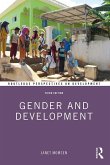Challenging the main ways we debate globalization, Global Displacements reveals how uneven geographies of capitalist development shape--and are shaped by--the aspirations and everyday struggles of people in the global South. * Makes an original contribution to the study of globalization by bringing together critical development and feminist theoretical approaches * Opens up new avenues for the analysis of global production as a long-term development strategy * Contributes novel theoretical insights drawn from the everyday experiences of disinvestment and precarious work on people's lives and their communities * Represents the first analysis of increasing uneven development among countries in the Caribbean * Calls for more rigorous studies of long accepted notions of the geographies of inequality and poverty in the global South
'In this moving and audacious book, Marion Werner challenges us to reckon with the real costs of global capitalism. Her inspiring stories of human struggles in Caribbean garment factories expose the tremendous courage needed to fight the odds and create more just futures.'
- Melissa W. Wright, Professor of Geography and Women's Studies, Pennsylvania State University, USA
'Werner's important new ethnography of garment work in Haiti and the Dominican Republic not only updates our knowledge of global apparel production for a new era of disinvestment and more "skilled" production, but develops a new analytical framework to show how a history of coloniality and its production of racial and gender difference remains central to global manufacturing.'
- Jane Collins, Professor of Community & Environmental Sociology, University of Wisconsin-Madison, USA
- Melissa W. Wright, Professor of Geography and Women's Studies, Pennsylvania State University, USA
'Werner's important new ethnography of garment work in Haiti and the Dominican Republic not only updates our knowledge of global apparel production for a new era of disinvestment and more "skilled" production, but develops a new analytical framework to show how a history of coloniality and its production of racial and gender difference remains central to global manufacturing.'
- Jane Collins, Professor of Community & Environmental Sociology, University of Wisconsin-Madison, USA








